Blog •
Posted on Nov 02, 2021
How to Build Your Career and Become a Magazine Editor
About the author
Reedsy's editorial team is a diverse group of industry experts devoted to helping authors write and publish beautiful books.
More about the Reedsy Editorial Team →Becoming a magazine editor might sound like a glamorous job that you often see in movies, but it's definitely an achievable career aspiration! In this post, we’ll be looking at how you can work towards this position from the ground up.
1. Learn the job description
A magazine editor is in a senior position at a publication. Their main tasks are to:
- Brainstorm and generate ideas to keep content production going;
- Supervise production timelines so that issues are printed on schedule;
- Delegate articles and manage staff as well as freelance writers;
- Copy edit, fact-check, and proofread content;
- Uphold the publication’s style;
- Coordinate with designers and photographers to create visuals;
- Work with other editors (including the chief) to build a brand for the magazine.
These responsibilities require well-developed management skills, organization, and a clear vision of what the magazine stands for. It is thus a position that you work towards, not one that you hold at the start of your career.
💲 How much do magazine editors make?
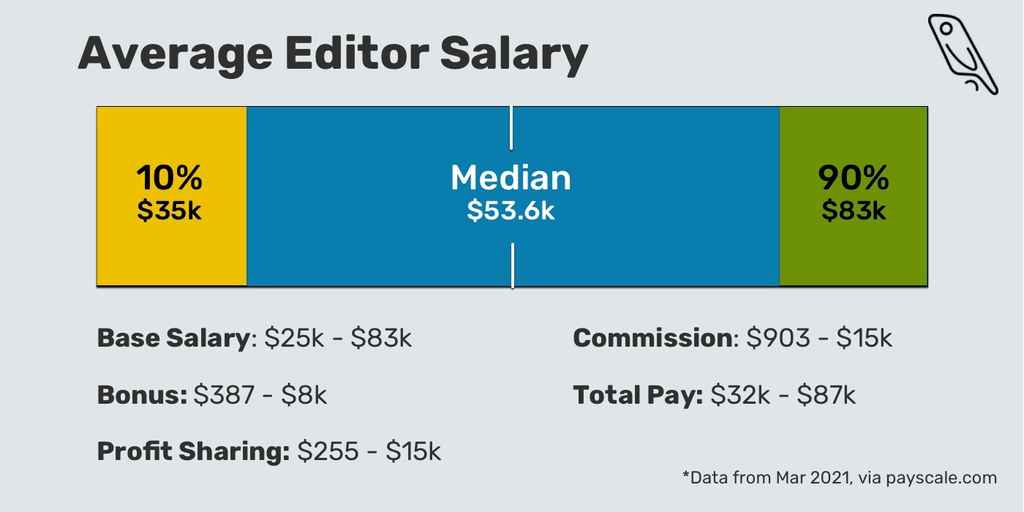 Similar to book editor salaries, magazine editors tend to make $40,000-$50,000 per year on average. The pay varies depending on the budget and prestige of a publication, the location of the job, as well as your personal experience, so be mindful of all these things when you negotiate your salary.
Similar to book editor salaries, magazine editors tend to make $40,000-$50,000 per year on average. The pay varies depending on the budget and prestige of a publication, the location of the job, as well as your personal experience, so be mindful of all these things when you negotiate your salary.
2. Start with writing or copy editing
Since this position is a senior role for those with experience, you can’t start out looking for magazine editing roles. Instead, you can become a journalist, a freelance writer, or a copy editor to gain experience.
Earn a relevant degree
To become a freelance writer, there’s no strict need to have a degree, though some formal training will certainly be useful. Doing a degree in Journalism, English, or Communications gives you the chance to read and write extensively, as well as learn about the theories behind written communication.
The same is true of becoming a copy editor: you don’t need a degree, though you can get a copy editing certificate from a reputable university or editing association to learn the ropes and boost your credentials before you get a job.
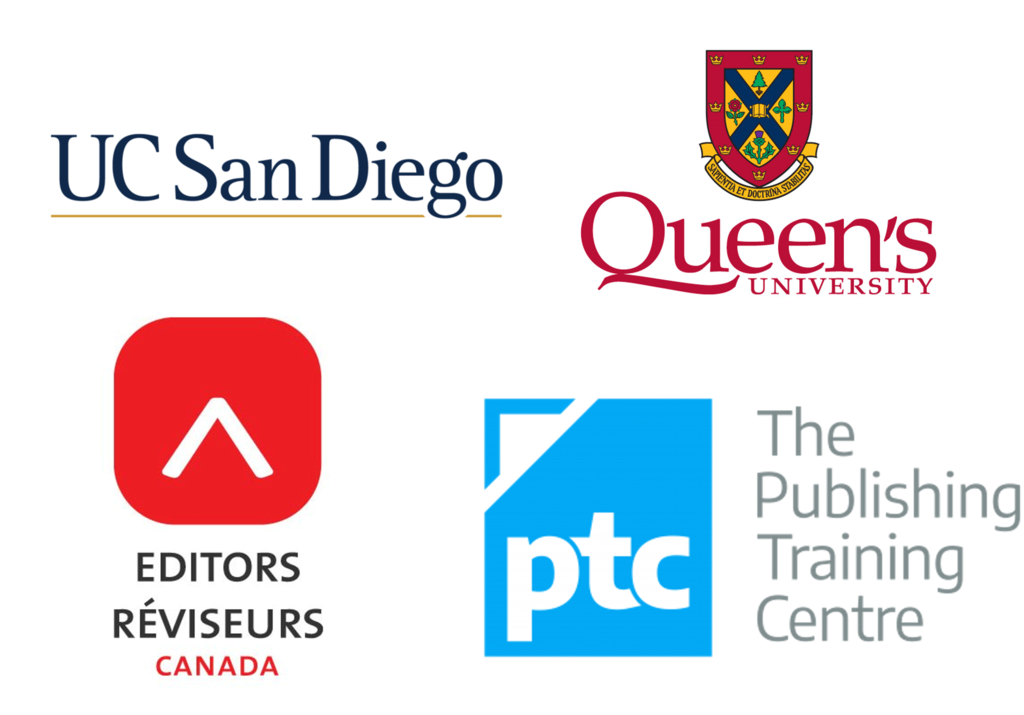
As you can probably guess, work in the media industry is fast-paced — the more you know prior to your job search, the more favorably employers will regard you.
Begin editing early
Even if you’re still in school, it’s never too early to begin sharpening your pen with extracurricular editing! Join your school’s newspaper or magazine staff, write articles, and go for editing positions. This will give you a taste of what creating news and magazine content is all about. And don’t underestimate student-run publications; by university-level, they can have a considerable readership.
Q: What early writing or editing experiences helped you break into the industry?
Suggested answer
I was an international school teacher, then a language learning materials writer, who turned proofreader and now editor. The flow evolved naturally!
Alex is available to hire on Reedsy ⏺
Alternatively, if you’re not starting in an academic environment, try to find entry-level editing and writing jobs (or editorial asssistant jobs) as soon as possible. You can work in magazine-adjacent industries like the publishing world or in marketing before making your move to a publication.
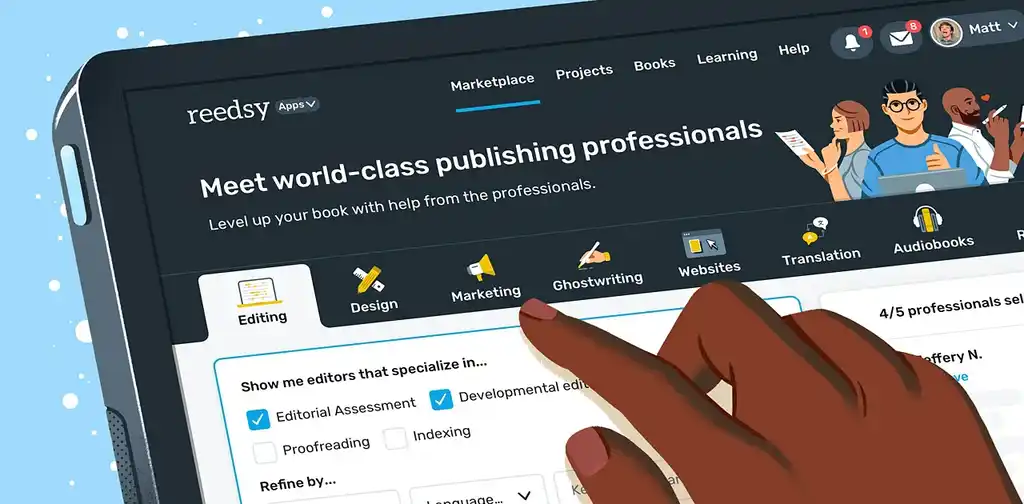
JOIN OUR NETWORK
Supercharge your freelance career
Find projects, set your own rates, and get free resources for growing your business.
Focus on digital media
Nowadays, it’s impossible to go into the news and magazine industry without knowing how to produce digital content. From writing “clickable” headlines to creating social media posts, anything that can help you stand out in the short-attention-span realm of the internet will be incredibly useful — and often crucial! — to your future job. So when you get the opportunity, try to work on as much digital content as possible.
3. Created a compelling portfolio
No matter what magazine you apply to or which position you go for, a thorough online portfolio will give you the best chance at getting the job you want. This can easily be done using platforms like Contently, MuckRack, or Journo Portfolio — though if you can spare a bit of effort, consider getting your own website. Done right, this can put you head-and-shoulders above your competitors!
Our post on how to create a writing portfolio offers a step-by-step guide on this process (which is also largely applicable to editors), if you’re interested. Otherwise, we’ve also got some key tips covered here.
Divide your portfolio into sections
Working in a niche, like lifestyle or fashion, isn’t uncommon when it comes to magazine editing. However, not everyone starts out working in a niche, which means you might gain a lot of experience in different areas throughout your career.
In order to highlight the experiences in your preferred niche (if you have one), or simply to make it easier for prospective employers to get a sense of your range of work, categorize your oeuvre. There are many ways you can divide your work — for instance, by:
- Kind of work — if you’ve done writing, editing, and other things;
- Prominence of work — if you’ve worked on a few high-profile articles that you want employers to see first, followed by lower-profile projects;
- Topic — art, food, political commentary, etc.;
- Type of writing — interviews, essays, news articles, etc.
It ultimately depends on your experience and how you think your work is best presented. If you have a large body of work, you can even combine methods; for example, dividing your work into writing, editing, and other categories, then listing pieces in order of prominence within each section.
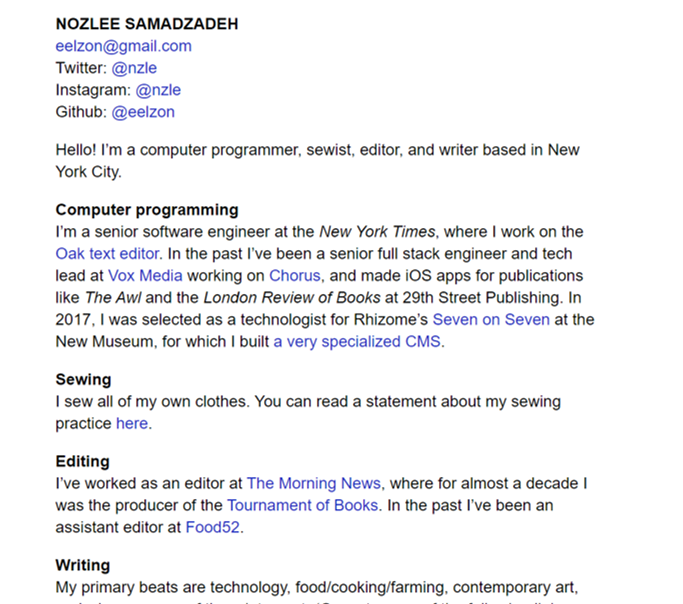 Looking for some inspiration? Writer and editor Nozlee Samadzadeh’s website is a prime example of simplicity and efficiency — just goes to show how minimal a website can be! (Not that it's also mobile friendly.)
Looking for some inspiration? Writer and editor Nozlee Samadzadeh’s website is a prime example of simplicity and efficiency — just goes to show how minimal a website can be! (Not that it's also mobile friendly.)
Keep it up-to-date
As a writer and editor, your collection of work will be constantly growing. There’s no need to include every single piece you’ve worked on, though you do want to ensure that you display the crème de la crème, the very best stuff that you’ve put out into the world.
So remember to update your portfolio regularly. A nice way to highlight your latest work is to list everything from most recent to least. Don’t forget to check for broken links, which can look unprofessional (and may disappoint readers too!).
4. Hone your leadership skills
As we mentioned, the magazine editor role is also a managerial position. Alongside impeccable writing and editing skills, as well as an eye for the latest trends, you also have to be a good team leader. We’ve talked about this at length in our post on the managing editor role, but in essence, a leader in a creative field such as magazine journalism needs to:
- Know how to work with their team to gather the best ideas;
- Develop and maintain creative visions for the team to work toward; and
- Communicate with team members to delegate work.
Becoming a good leader and manager comes with time and practice, but we do have a couple of suggestions you might find useful as you work on your career.
Communication and leadership skills are crucial to senior roles like magazine editor
Click to tweet!
Get to know all the roles in your team
If you want to be a good magazine editor, you have to know all the sections that you might have to oversee. As a team manager, you must know whom to delegate certain work to, as well as which person or team to involve when a particular problem or idea arises.
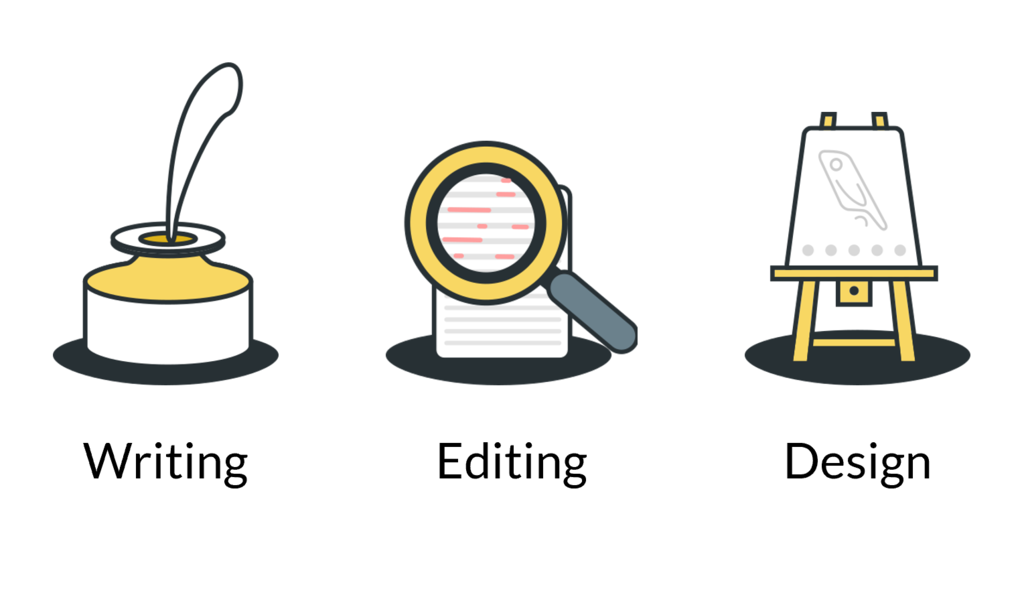 You’ll also have to liaise with other creatives and departments, like designers or accountants (when it comes to allowances and budgeting). The better you understand a publication’s overall operations, the more likely you’ll excel when given a managerial position.
You’ll also have to liaise with other creatives and departments, like designers or accountants (when it comes to allowances and budgeting). The better you understand a publication’s overall operations, the more likely you’ll excel when given a managerial position.
Be clear in your communication
Communication is crucial when it comes to management; you need to make sure that everyone understands what’s expected of them and how their work factors into the publication as a whole. Deadlines, actions, requirements — everything should be clear and accessible to your staff. Keep this in mind as you work, and always be refining your communication skills!
5. Look out for job opportunities
You’ve gotten some professional writing and editing experience, all of which is nicely displayed on your online portfolio, and you’ve worked on your management skills — now’s the time to look for some good job opportunities.
If there’s an internal vacancy at the publication where you already work, of course you should go for it! But it’s not always that easy — many senior editors are passionate about their jobs and unlikely to leave their positions. For that reason, we’re recommending a few alternatives to finding the right magazine editor job for you.

JOIN REEDSY
Find exciting new projects
We connect publishing professionals with our community of 1,500,000 authors.
Make use of industry job boards
There are some job boards out there that specialize in promoting vacancies in the news media and publishing industries. These boards will aggregate most of the most recent editing jobs for you to browse.
Mediabistro is a particularly well-known platform; you can also follow the “editing” search on LinkedIn for some quality opportunities. And if you want automatic summaries of the latest vacancies sent directly to your inbox, most job boards have the helpful option to turn on email alerts!
Never neglect social media
At this point, it’s a grave mistake for just about anyone to underestimate the power of social media. Far from being just for entertainment, these virtual platforms are now where most of us consume content and connect with others, both personally and professionally. And it’s especially important for those who rely so much on networks, like writers and editors.
There are several places you can go to build your connections and look out for opportunities, though the most important platform in this industry is Twitter. Writers and editors are very active on Twitter — they share articles, calls for pitches, and even vacancies. Even if you prefer not to be too active on social media, you can always just use your account as a way to browse for opportunities!
With that, our guide on how to become a magazine editor is complete. It will take some hard work to get there, but if you love what you do, it’ll be worth it! And what’s more, your magazine editing journey can also open doors to other kinds of work, like book editing, if you ever change your mind. Regardless of what you choose to do, we wish you all the best!
Follow Reedsy on LinkedIn for more tips on working in publishing and freelancing!
Reviewed by Linnea Gradin
The editor-in-chief of the Reedsy Freelancer blog, Linnea is a writer and marketer with a degree from the University of Cambridge. Her focus is to provide aspiring editors and book designers with the resources to further their careers.
As the editor of Reedsy’s freelancer blog and a writer on the Reedsy team, Linnea has her hand in a bit of everything, from writing about writing, publishing, and self-publishing, to curating expert content for freelancing professionals. Working together with some of the top talent in the industry, she organizes insightful webinars, and develops resources to make publishing more accessible to writers and (aspiring) publishing professionals alike. When she’s not reading, she can be found dribbling on the football pitch, dabbling in foreign languages, or exploring the local cuisine of whatever country she happens to be in at the time.

